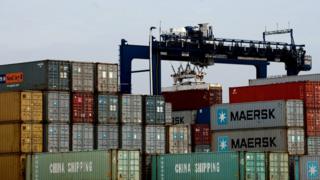Most imports tariff-free under no-deal plan

Image copyright
Phil Coomes
The government has announced that most imports into the UK would not attract a tariff in the event of a no-deal Brexit.
Under a temporary scheme 87% of imports by value would be eligible for zero-tariff access.
At the moment 80% of imports are tariff free.
Tariffs would be maintained to protect some industries, including agriculture. Beef, lamb, poultry and some dairy products would receive protection.
- Government sets out plans for Irish border in a no-deal Brexit
A tariff is a tax applied to goods that are traded on international markets.
In the great majority of cases, tariffs are applied to imported goods by the country importing them. But there can also be tariffs on exported goods.
How would the new system work?
The new tariff regime would mark a shift in favour of products from non-EU countries.
It would mean 82% of imports from the EU would be tariff-free, down from 100% now.
92% percent of imports from the rest of the world would pay no border duty, up from 56%.
Under the plan, the UK car industry will receive some protection, with some imported cars attracting tariffs.
But car parts from the EU would be tariff free, which will help car plants in the UK.
Also, the ceramics industry would receive some protection from cheap imports.
Where are the big changes?
Industry bodies and businesses are still poring over the 1,477-page document which outlines the new plan. Any industry benefiting from protective tariffs will have to weigh up whether they will be met by export tariffs.
Imports of cars from the EU will have a tariff of 10.6% applied, which would add £1,500 to a typical family car. Volkswagen has already said the cost would be passed on to the buyer.
Car parts such as engines would have no new tax applied to avoid disruption to the movement of components.
What has been the reaction?
Unite assistant general secretary for manufacturing Steve Turner described the potential no-deal as “economic vandalism which is threatening jobs and livelihoods” and said called for tariffs to be dropped on EU imports.
Carolyn Fairbairn, director general of business lobby group the CBI told the Today Programme described the changes as “the biggest change in terms of trade since mid 19th century”.
“These are being imposed on this country with no consultation with business with no time to prepare. This is no way to run a country,” she said, warning that the impact could be a “sledgehammer to our economy” as companies spend more on stockpiling.
Adam Marshall, director general of the British Chambers of Commerce said: “The abruptness of changes to tariff rates in the event of a no-deal exit from the EU would be an unwelcome shock to many of the businesses affected.”
He conceded that the government had listened to businesses and protected some areas of industry from cheap imports.
Trade minister Liam Fox will speak to business leaders at 15:00 GMT to discuss the tariffs, Reuters reported.
Why is the government cutting tariffs?
Trade Policy Minister George Hollingbery said: “Our priority is securing a deal with the EU as this will avoid disruption to our global trading relationships. However we must prepare for all eventualities.”
He said the government’s plan “represents a modest liberalisation of tariffs”.
“This balanced approach will help to support British jobs and avoid potential price spikes that would hit the poorest households the hardest,” he said.
“The new tariff seems a reasonable compromise between protecting vulnerable (and politically important) sectors and keeping prices down for consumers,” said Prof Alan Winters, director of the UK Trade Policy Observatory at the University of Sussex.
“For producers, there will be relief in some sectors and nasty surprises for others,” he said, adding that there is much work to be done in combing through all the changes.
How will the Irish border system work?
The government also announced that it will not introduce any new checks or controls, or require customs declarations for nearly all goods moving from across the border from Ireland to Northern Ireland in the event the UK leaves the EU without a deal.
The decision to drop all checks to avoid friction at the UK’s land border with the EU will be temporary while longer term solutions are negotiated and was taken to recognise what the government described as “the unique social political and economic circumstances of Northern Ireland.
The government said tariffs will be payable on goods moving from the EU into the rest of the UK via Northern Ireland.
It insisted that this would create no border down the Irish sea because there would be no checks on goods moved between Northern Ireland and Britain.
“Not levying tariffs on the Irish border is not a long run solution,” said Prof Winters.
It “almost certainly” violates World Trade Organisation (WTO) rules that demand equal treatment for all trading partners, he said.
“I doubt if there will be a serious challenge in the WTO for a while, on the grounds that it was an emergency measure and that disputes take a long time, but it will certainly be another awkward issue in any future trade talks,” he said.
“Leaving the Irish border open also opens up the possibility of some EU goods being shipped to the UK via Ireland and so avoiding UK tariffs.”

